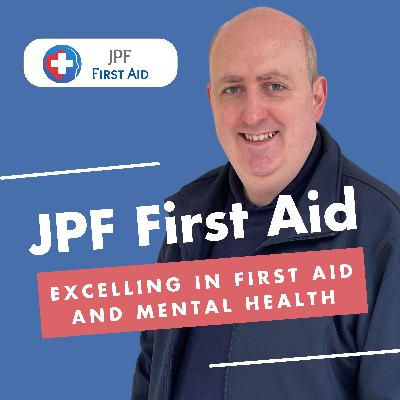How to Respond to Choking
Description
In Episode 20 of the JPF First Aid Podcast, host John Fogarty, founder of JPF First Aid, tackles one of the most feared first aid scenarios—choking. He explains the difference between mild and severe choking, how to provide immediate assistance, and the importance of quick intervention. This episode equips listeners with essential life-saving techniques to confidently manage a choking emergency.
Key Takeaways
Mild vs. Severe Choking: Mild choking allows for some airflow, meaning the casualty can cough. Severe choking is a full airway obstruction requiring immediate action.
Encouraging Coughing First: If a person can still cough forcefully, they should be encouraged to do so rather than receiving physical interventions.
Steps for Severe Choking:
- Ask if they are choking – This confirms the need for intervention and gains consent.
- Give up to 5 back blows – Use the heel of your hand, striking between the shoulder blades while leaning the casualty forward.
- Perform up to 5 abdominal thrusts – Stand behind them, clench a fist between the navel and sternum, and pull sharply inwards and upwards.
- Call 999 or 112 if needed – If the object is not dislodged, emergency services must be contacted. Continue alternating back blows and abdominal thrusts until help arrives.
Special Considerations: Pregnant casualties should receive chest thrusts instead of abdominal thrusts. If a choking person becomes unresponsive, start CPR immediately, checking for airway obstructions before giving rescue breaths.
Importance of Training: Attending a first aid course provides hands-on practice, ensuring confidence in responding to a real-life choking emergency.
Key Moments
"Choking is one of the scariest emergencies, but knowing the right steps can save a life."
"Encourage a strong cough first—don't give water, as it may worsen the blockage."
"Always call for help if choking persists. CPR may be needed if they become unresponsive."
"First aid training is vital—practicing these techniques in a course makes all the difference in an emergency."
About the Host
John Fogarty has a training background dating back to 2005, with achievements including a teaching qualification and assessor standard. He has previously worked with two first aid charities, delivering sessions in workplace and educational environments.
John has consistently received excellent feedback for his delivery and customer service, as evident in numerous reviews. He ensures learners enjoy and achieve their goals, and works with customers to select the right courses and resolves any issues promptly.
Find out more at www.jpffirstaid.co.uk/
Hosted on Acast. See acast.com/privacy for more information.





